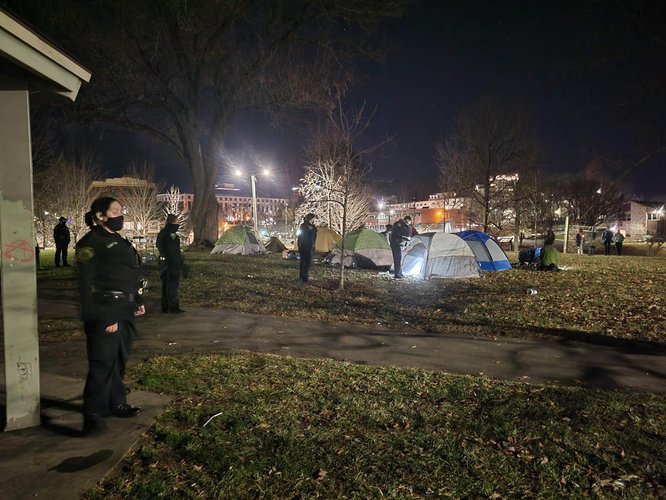
A federal court in North Carolina that entered a blatantly unconstitutional gag order on the press in February may have just done it again. federal courthouse, asheville, north carolina by Aimee Dars Ellis is licensed under CC BY-NC-SA 2.0.
A federal court in Asheville, North Carolina, may have entered one of the most egregiously unconstitutional gag orders against the press we’ve ever seen — for the second time. The order arguably purports to bar the entire media from reporting about a University of North Carolina student who was expelled over sexual abuse allegations.
We say “may” because, as discussed below, the order is ambiguous as to whether it intends to silence the press or whether only UNC is gagged. But even if the court did mean to exclude the press from the order, and inadvertently failed to say so, the effect is the same: a constitutionally intolerable chilling effect on journalists’ ability to report news without fear of punishment.
The February gag order
The student, litigating under “Jacob Doe,” is suing UNC over its handling of the abuse allegations against him. In February, a judge granted his request for a temporary restraining order that required UNC to not only refrain from discussing the case itself but to inform media outlets that they’re barred from reporting anything about Doe, including the university disciplinary proceedings against him.
Freedom of the Press Foundation (FPF) joined the ACLU of North Carolina and UCLA First Amendment law professor Eugene Volokh in filing a brief opposing the unconstitutional order. As we’ve explained time and again, the Supreme Court has made clear that prior restraints on publication, if ever permissible, require an extraordinary emergency. The court has never upheld a prior restraint on the press, even when the government claimed national security risks.
And of course, judges have no jurisdiction to order unnamed media outlets that aren’t parties to any matter before them to do anything, let alone stop the presses. Whichever outlets were “prohibited from publishing” were never afforded any hearing or opportunity to assert their rights.
At the time, the student surprised everyone by agreeing to drop the gag order just days after it was entered. We all thought that was the end of that. But then …
The October gag order
According to court documents, someone recently filed a public records request with UNC that put Doe at risk of being publicly identified. Doe responded with a motion for a restraining order virtually identical to the February one — including the gag on the media.
FPF again joined the ACLU of NC in filing a brief on Monday opposing the motion and pointing out the numerous constitutional and jurisdictional problems with broad judicial censorship of nonparty media outlets. But on Wednesday, the court granted the motion.
This time, the conclusion of the court’s order only expressly silences UNC. But the order also says it grants the student’s motion without qualification and without any carve-out for the press. And the court further says its reasoning is the same as in February, implying an intention to achieve the same result.
Journalists — like the rest of us — will be left scratching their heads in trying to figure out the court’s intentions. Does the gag order only prevent UNC from releasing information about Doe, or does it apply to the press? The journalists at FPF’s U.S. Press Freedom Tracker, for example, read the order as a prior restraint on the press, and we agree that that’s the most reasonable reading.
Every judge knows how to grant only part of a motion (i.e., “Plaintiff’s motion is granted in part and denied in part.”). When a judge omits language to that effect, despite having likely used it dozens of times in their career, it’s logical to assume the omission was intentional.
What’s next?
So what are journalists to do, now that there may be a court order purporting to bar them from reporting the news?
While it may be courageous for journalists to just ignore unconstitutional censorship orders (as some have in similar situations), it’s likely journalists will think twice before reporting on the case and risking punishment. Even if they know that judges have no power to hold unnamed, nonparty reporters in contempt, how can they trust a court that so drastically overstepped constitutional boundaries at least once, and possibly twice?
To avoid self-censorship by the press, the court should, at the very least, clarify its order so that journalists know whether or not it intended to silence them. If it didn’t, the clarification would eliminate the chilling effect, and if it did, it would allow journalists and press freedom groups to pursue legal challenges.
But the court would be better off reversing course altogether and withdrawing the order, which is improper even if it was intended to only gag UNC. The law requires UNC to comply with North Carolina’s public records laws unless the exceptions written into the law apply. Judges have no power to create their own exceptions to open records laws passed by elected lawmakers by ordering government agencies not to comply with them.
And this needs to happen fast. Normally temporary restraining orders like this one remain in effect for a short time (14 days under North Carolina law), pending a full hearing on whether to make them permanent. But the judge assigned to Doe’s case (the one who entered the unconstitutional February order) is away through at least the end of October, and the judge who issued the new gag order in his stead says it will remain in effect until he’s back.
That’s unacceptable in a case with such serious First Amendment ramifications. As the Supreme Court has explained, "The loss of First Amendment freedoms, for even minimal periods of time, unquestionably constitutes irreparable injury."



